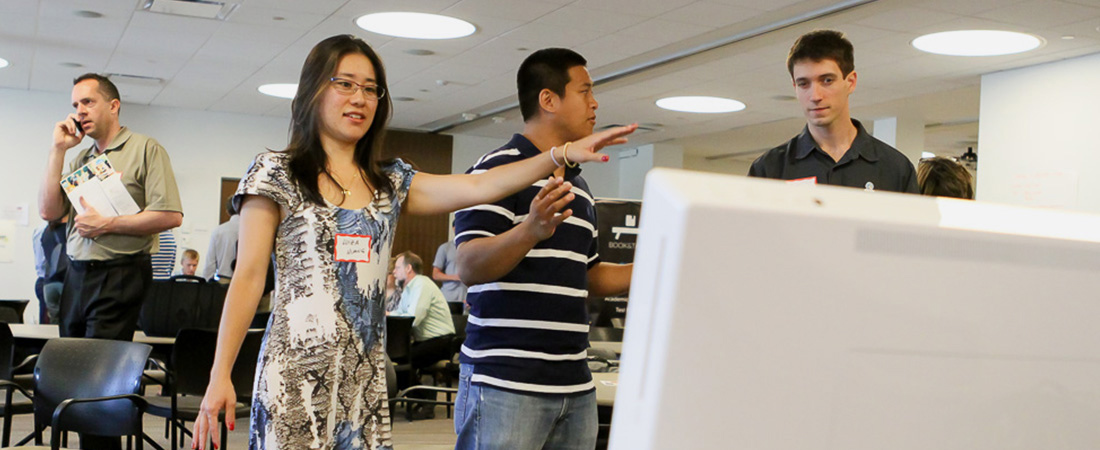Teachers, Innovators Come Together

Educators attending Beta Teacher got a chance to try new educational products.
Attention, teachers: The future of school looks cool. And it’s coming to a screen near you—soon.
This was the impression left by Beta Teacher, an event that brought together innovators from 20 local educational technology (edtech) startups and teachers interested in expanding the technological horizons of their classrooms. Beta Teacher was held at EDC and organized by LearnLaunch, a Boston-based edtech accelerator and incubator, and the Massachusetts Computer Using Educators network (MassCUE).
Beta Teacher showcased a variety of creative innovations sure to enhance modern learning and teaching. In one corner of EDC’s conference center, a teacher scrolled through an interactive, digital timeline that reimagined historical events through the lens of social media. Across the room, two molecular biologists talked to teachers about the small medical device they’ve invented that allows high school students to study DNA. At other booths, educators controlled on-screen characters with a wave of their arm.
Jean Hammond, co-founder of LearnLaunch, says that her accelerator is “trying to support the edtech innovation ecosystem by giving startups enough support so they can be viable.” She adds that the company has already identified over 240 “early stage startups” throughout all levels of the edtech industry, from products aimed at preschool classrooms to corporate trainings.
Connecting them with interested educators at events such as Beta Teacher is part of that support. Giving teachers an insider’s look into the latest educational products is an added bonus.
“Companies are so hungry to get teacher feedback and to find teachers who will beta test their products,” says Hammond. “And teachers get excited, too. They don’t want everything in the classroom to be the way it used to be.”
Bob Spielvogel, EDC’s chief technology officer (CTO), describes Beta Teacher as a “win-win” event, benefiting both teachers and entrepreneurs.
“Edtech startups are bringing fresh perspectives to the challenges teachers face,” he says. “Their ultimate success is based on creating something that has real value for teachers, so they are very sensitive to learning from teachers about what works.”
The startups’ willingness and desire to engage directly with teachers is in line with the way EDC’s own developers work.
“Beta Teacher provides a way to incorporate teachers directly into the design and refinement process. This is simpatico with how EDC approaches curriculum design,” says Spielvogel.
Change and innovation
Yoran Brondsema, CTO of the startup Hstry, says his company was once described as “Facebook for history” by one of their student users. It creates interactive, media-rich, online timelines to explore historical events, even allowing teachers and students to use the Hstry interface to build their own timelines.
Hstry’s interactive timelines have a distinctly modern feel, featuring images, videos, and quiz questions about specific topics. One timeline covers the history of the World Cup. Another chronicles different parts of the American Revolution. Social media is part of the Hstry team’s approach. For example, on April 18 and 19, 2014, they partnered with the Paul Revere House to reenact Revere’s ride via 140-character updates from the account @PaulRevere1734.
Hstry, which received seed funding and mentoring support, is a LearnLaunch success story. Now, they are on their own and eager to get their product into the hands (and onto the computers) of local teachers. Attending Beta Teacher is one way to do that.
“Meeting teachers one-on-one is a great way to show the product,” says Brondsema.
Sebastian Kraves, from the biotechnology startup team miniPCR, says that events like Beta Teacher are important because connecting directly with teachers is a fundamental part of their mission.
“We wanted to find a direct channel to teachers and classrooms,” he says.
Kraves’ miniPCR device is a small, solid, rectangular prism with transparent acrylic sides and scientific innards. But it’s powerful—it can be used to copy DNA, an essential task in the field of biotechnology. MiniPCR is also a fraction of the cost (and size) of many of its competitors.
“Our whole idea is to make this type of science accessible, not intimidating,” Kraves says. “Knowing what teachers want is key.”